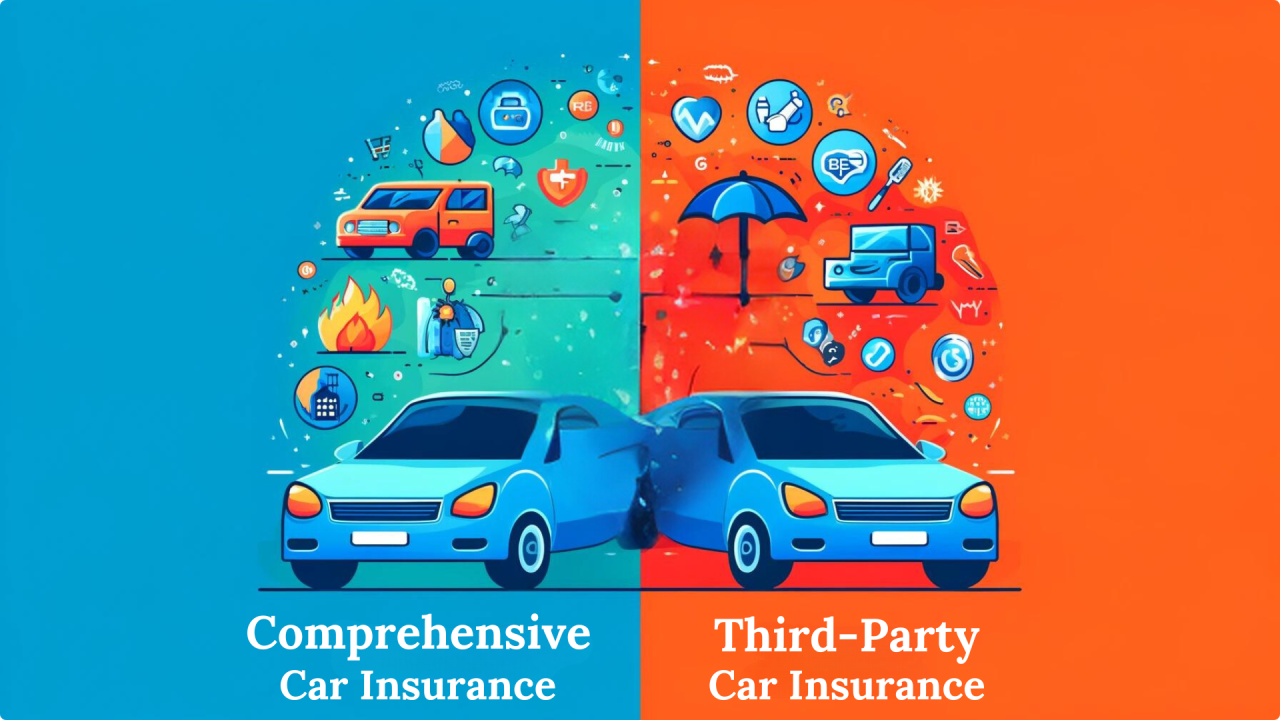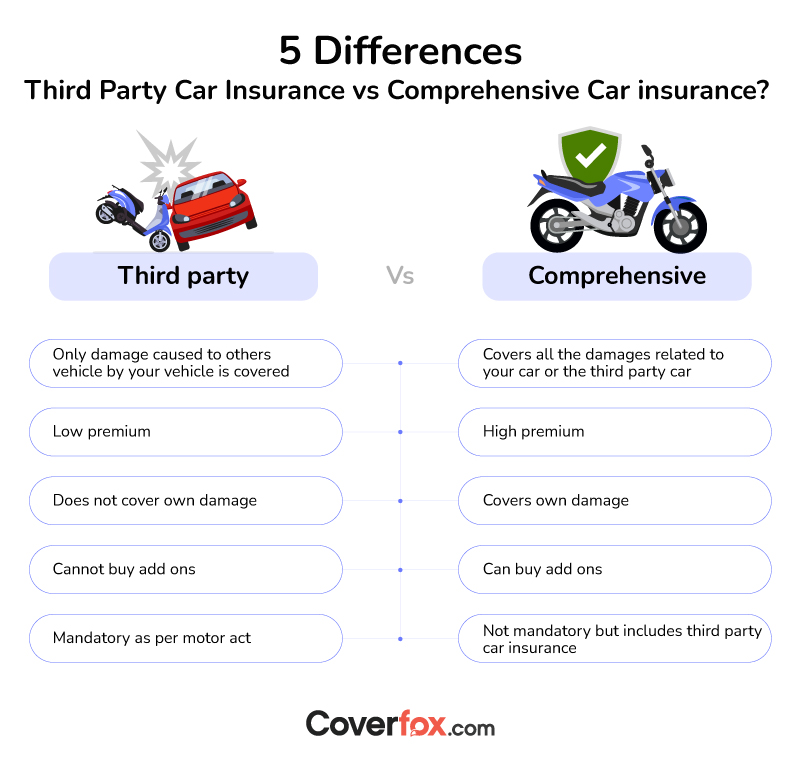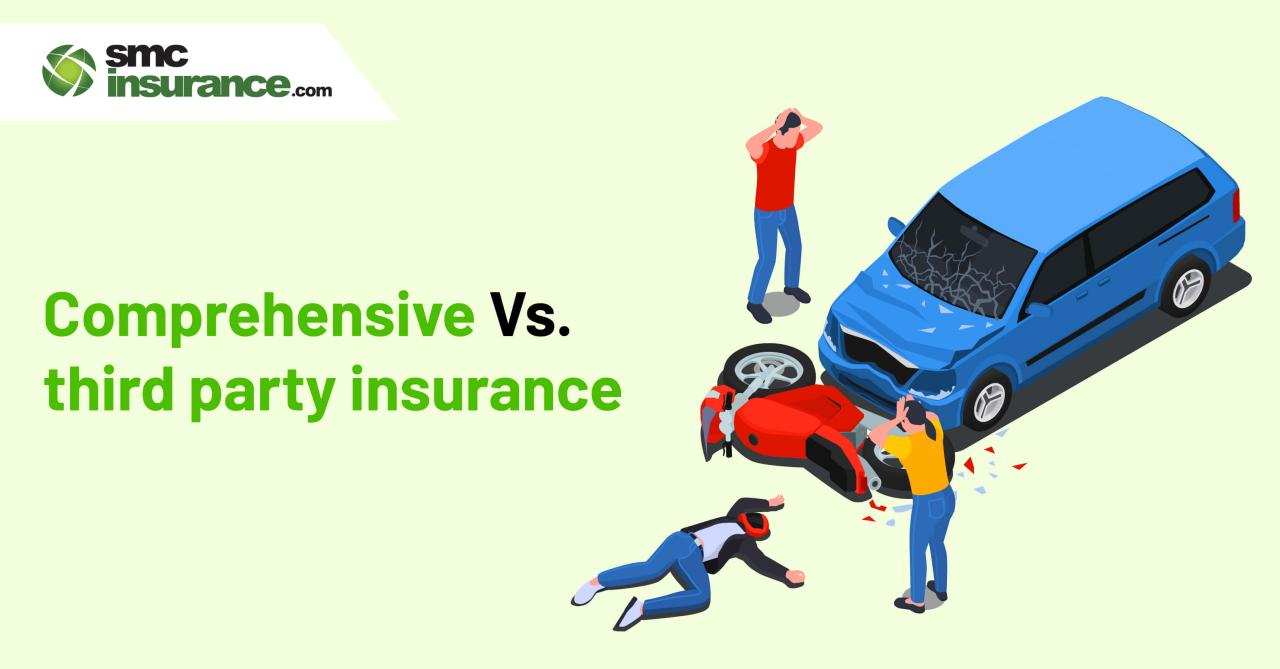Comprehensive vs third-party car insurance explained: A Detailed Analysis

Comprehensive vs third-party car insurance explained sets the stage for this enthralling narrative, offering readers a glimpse into a story that is rich in detail and brimming with originality. From understanding what each type covers to making the right choice, this exploration will provide valuable insights for all car owners.
As we delve deeper into the realm of car insurance, we uncover the nuances that differentiate comprehensive coverage from third-party options, shedding light on the complexities of this crucial decision-making process.
Comprehensive Car Insurance
Comprehensive car insurance provides coverage for a wide range of incidents beyond just collisions, offering more extensive protection for your vehicle.
Coverage Details
- Damage from natural disasters such as hurricanes, floods, or earthquakes
- Theft or vandalism
- Fire damage
- Broken or shattered windows
- Animal collisions
Examples of Benefits
- If your car is stolen and never recovered, comprehensive insurance can help cover the cost of replacing the vehicle.
- In the event of a hailstorm damaging your car, comprehensive insurance will assist in repairing the dents and other related damages.
- If a tree falls on your car during a storm, comprehensive coverage will help with the repair or replacement costs.
Cost Comparison
While comprehensive car insurance typically costs more than basic liability or third-party coverage, the additional benefits and peace of mind it offers can outweigh the higher premium. The cost of comprehensive insurance will vary based on factors such as the make and model of your car, your driving history, and your location.
Third-Party Car Insurance

Third-party car insurance is a type of insurance coverage that provides financial protection to the insured individual against claims from third parties for damages or injuries resulting from an accident where the insured driver is at fault.
Limitations Compared to Comprehensive Coverage
- Third-party car insurance does not cover damages to the insured individual's vehicle in case of an accident where they are at fault.
- It does not provide coverage for theft, fire, or any other non-collision-related damages to the insured vehicle.
- There are usually limits on the amount that can be claimed for third-party damages, which may not fully cover all expenses in a severe accident.
Scenarios where Opting for Third-Party Insurance Makes Sense
- For older vehicles with a low market value where the cost of comprehensive insurance may outweigh the potential benefits.
- For individuals on a tight budget who prioritize legal compliance and basic coverage over comprehensive protection.
- In situations where the insured individual is confident in their driving skills and unlikely to cause an accident.
Coverage Comparison

When comparing comprehensive and third-party car insurance, it is essential to understand the differences in coverage and premiums to make an informed decision based on your needs and budget
Coverage Provided
| Aspect | Comprehensive Car Insurance | Third-Party Car Insurance |
|---|---|---|
| Damage to Your Vehicle | Provides coverage for damage to your own vehicle due to accidents, theft, or natural disasters. | Does not cover damage to your vehicle, only covers damage to third-party vehicles. |
| Third-Party Liability | Covers damage to third-party vehicles and property as well as injuries to third parties. | Provides coverage for damage to third-party vehicles and property, including injuries to third parties. |
| Personal Accident Cover | May include personal accident cover for the driver and passengers. | Does not typically include personal accident cover for the driver or passengers. |
Premium Differences
Comprehensive car insurance generally has higher premiums compared to third-party insurance due to the broader coverage it offers. The premium amount for either type of insurance can vary based on factors such as the vehicle's make and model, the driver's age and driving history, and the location where the vehicle is primarily used.
Decision Factors
When deciding between comprehensive and third-party car insurance, factors to consider include the value of your vehicle, your budget, your driving habits, and the level of risk you are willing to take. If you have a new or high-value vehicle, comprehensive insurance may provide more peace of mind.
However, if you have an older vehicle or are looking to save on premiums, third-party insurance might be a more cost-effective option.
Making the Right Choice

Choosing between Comprehensive and Third-Party Car Insurance can be a crucial decision that greatly impacts your financial well-being in case of an accident. Here are some tips to help you make the right choice based on your individual needs.
Step-by-Step Guide for Evaluating Individual Insurance Needs
- Assess the Value of Your Car: Determine the current market value of your vehicle to understand if it's worth investing in Comprehensive Insurance.
- Evaluate Your Driving Habits: Consider how often you drive, where you park your car, and your overall risk tolerance to assess the level of coverage you need.
- Review Your Budget: Compare the premiums of Comprehensive and Third-Party Insurance to see what fits within your financial capabilities without compromising on coverage.
- Consider Additional Benefits: Look into the additional benefits offered by Comprehensive Insurance, such as roadside assistance, car rental coverage, and more.
Real-Life Examples of Individuals Benefiting from their Choice
John, a new car owner, opted for Comprehensive Insurance and was thankful when his car got stolen, as he received full compensation for the loss.
Sarah, a budget-conscious driver, chose Third-Party Insurance and was relieved when she was involved in a minor accident, as her repair costs were covered by the insurance.
Last Word
In conclusion, the comparison between comprehensive and third-party car insurance unveils a landscape where informed choices can lead to significant savings and enhanced protection. By weighing the benefits and limitations of each option, individuals can navigate the insurance market with confidence and clarity.
FAQ Overview
What does comprehensive car insurance cover?
Comprehensive car insurance typically covers damage to your own vehicle from accidents, theft, vandalism, natural disasters, and more.
When would opting for third-party car insurance make sense?
Opting for third-party car insurance might make sense if you have an older vehicle with a lower value and want to meet legal requirements at a lower cost.
How do I choose between comprehensive and third-party car insurance?
To choose between the two, consider factors like the value of your car, your budget, and how much coverage you need for peace of mind.

